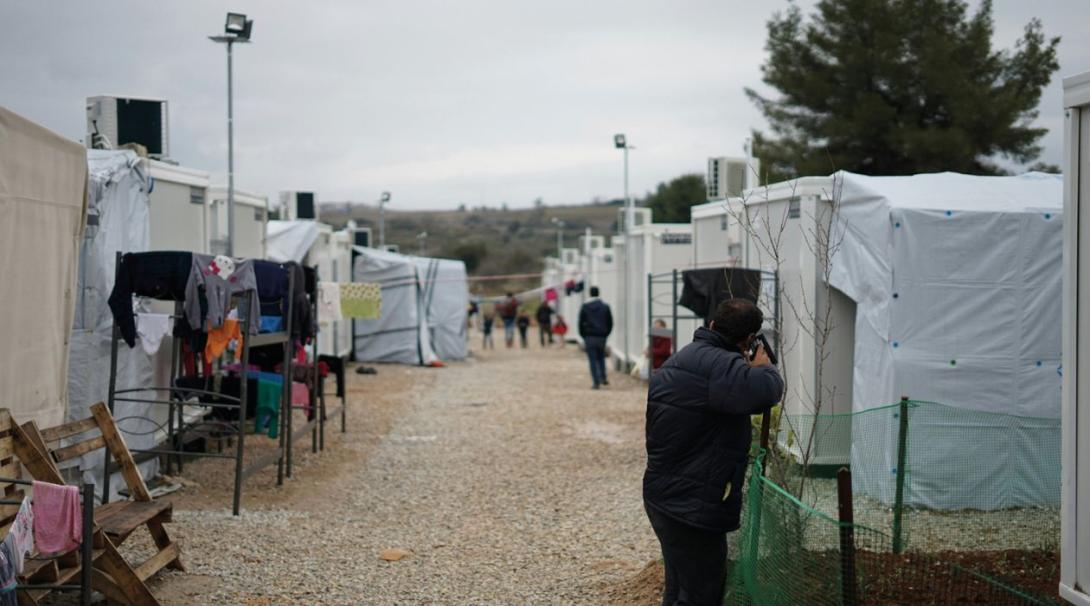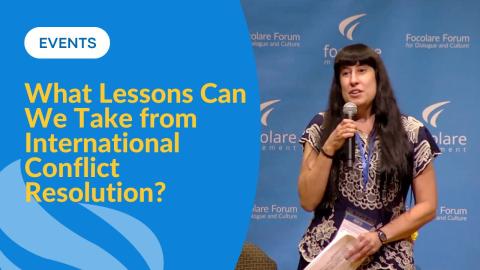
Photo by Julie Ricard | Unsplash
“With the coming of these displaced people, [Mrs. Shortley] was obliged to give new thought to a good many things.” —Flannery O’Connor, from her novella, “The Displaced Person”
A talented writer can, in short order, place a reader into concrete realities and differing perspectives. A Catholic short story author like Flannery O’Connor (1925-64) can map the fragmented stories of human struggle onto the broken and wounded Body of Christ.
In contrast, an abstract issue like immigration is too often removed from personal reality in the political realm stemming from what the Trappist monk and writer Thomas Merton (1915-68) saw as “a deep failure of communication,” the need “to distinguish the real happening from the pseudo-event” (from his book, Faith and Violence). Sometimes what stands in the way of discerning a Christian response to a complex situation like immigration is not a lack of information. Two Catholic writers of the last century, O’Connor and Merton, can help us step away from the heated rhetoric of the twenty-four-hour news cycle and put the lives of all who are affected into focus.
O’Connor’s characters Mr. and Mrs. Shortley were poor, white laborers who feared the threat to their jobs posed by an immigrant Polish family and distrusted the cultural attitudes of foreigners. Mrs. Shortley defines Mr. Guizac, “The Displaced Person” in her story of the same name, as one of those who “ain’t where they were born at and there’s nowhere for them to go—like if you was run out of here and wouldn’t nobody have you.”
The hardships of Thomas Merton’s early life were, in contrast, not as extreme as the fictional Guizacs—nor the migrants and refugees in today’s news. Merton’s early life was characterized by many physical and emotional displacements—fleeing with expat parents from war-torn France, the childhood death of his mother, becoming again an outsider in French and English schools, and losing his father as a teen and his only sibling to the Second World War. Though Merton was not the political exile of religious or ethnic hatred fleeing the death camp, nor fleeing poverty or gang violence in Central America, his position as one many times uprooted from a stable home and from loved ones predisposed his heart to those on the margins.
If Merton’s decision to vow stability as a Trappist monk in rural Kentucky was initially an escape from a broken world to a tranquil island, he would later discover like the English poet John Donne that “no man is an island,” but also, no monastery is an island.
Merton had an epiphany experience in downtown Louisville that he wrote about in his book, Conjectures of a Guilty Bystander:
"In Louisville, at the corner of Fourth and Walnut, in the center of the shopping district, I was suddenly overwhelmed with the realization that I loved all these people, that they were mine and I theirs, that we could not be alien to one another even though we were total strangers."
It was suddenly revealed to him, in a fresh way, how he loved all the strangers surrounding him on a random corner amidst their mundane activity. Merton continued, in his recording of the experience: “My solitude, however, is not my own, for I see now how much it belongs to them—and that I have a responsibility for it in their regard, not just in my own…. There are no strangers!” Monastic life became for him, then, an intentional marginalization in order to witness in solidarity with those who did not choose such a fate.
To Merton, the contemplative must re-engage the world, see the faces of its people and respond in love, without absorbing the noise of the propaganda machine and echoing back violence. In turn, the lay Christian, “in the world,” should seek space for such silence that encourages reflection rather than impulsive reaction.
Merton again: “Certainly events happen and they affect me as they do other people…but I refrain from knowing them in their fresh condition as ‘news.’ When they reach me they have become slightly stale. I eat the same tragedies as others, but in the form of tasteless crusts…. Living without news is like living without cigarettes…. The need for this habitual indulgence quickly disappears. So, when you hear news without the ‘need’ to hear it, it tears you differently. And you treat it differently too” (Faith and Violence).
How quaint the media landscape of Merton’s mid-twentieth century seems to us now! Yet, his advice to distance oneself from the media-generated pseudo-events seems now more relevant when contemporary politicians can propagate unmediated pseudo-facts on their own platforms which can spawn actual events.
Two Catholic writers of the last century, Flannery O’Connor and Thomas Merton, can help us step away from the heated rhetoric of the twenty-four-hour news cycle and put the lives of all who are affected into focus.
Much of the rhetoric on both sides of the political spectrum has done nothing to address concrete problems of immigrant populations in the United States, nor allay the real concerns of people in communities affected by migration. When baseless claims were made by one political party about Haitians in Springfield, Ohio, falsehoods directed against that community created threats and disruptions to the entire community. However good it is for an opposition party or journalists to call out a lie, does it truly change the mind of the modern-day Mrs. Shortleys of the world? Does fact-checking win the vote of a family who once relied on the manufacturing jobs of Springfield? This would imply that a disease of the heart and of communication, an inability to recognize the Christ in our neighbors and to speak the truth in love, can be cured with counter-slogans for the head. “Until we admit that we are subject to the same risk and the same follies… [w]e will continue to be deadlock with adversaries who happen to be our own mirror image,” Merton wrote (Faith and Violence).
We are all Flannery O’Connor’s displaced persons to the degree that we fail to recognize our own and others’ true identities as children of God, with an eternal place to go, and Someone who will have us. And to recognize the wounds of others as united with our own in the broken and resurrected Christ is also to recognize, with Thomas Merton, that “There are no strangers!”












